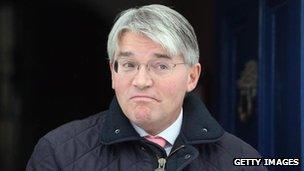'Plebgate': Andrew Mitchell blasts media
- Published

Four people have been arrested as part of the inquiry into the row involving Mr Mitchell
Andrew Mitchell has claimed he was caught "between the pincers" of the police and the media in the "plebgate" row which led to his resignation from the cabinet in October 2012.
He quit as Tory chief whip after it was alleged he called Downing Street police officers "plebs", which he denies.
Further doubt has recently been cast on officers' accounts of his behaviour.
Mr Mitchell told Channel 4's Dispatches programme his treatment by the press had been "completely wrong".
The coverage - which included demands for his resignation - made it appear that the Leveson Inquiry into media standards, including relations with the police, "had never even taken place", he argued.
While Mr Mitchell admits swearing after a police officer refused to let him exit through the main Downing Street gate with his bicycle on 19 September last year, he denies directly swearing at the officer and insists he did not lose his temper or call him a "pleb".
CCTV footage has cast doubt on the original police accounts of the row.
Four people have been arrested in an investigation into their handling and reporting of the episode.
Mr Mitchell told Dispatches, which is due to be broadcast on Monday, night: "I was caught between the pincers of the police on the one hand and the media on the other in a way that would lead you to believe that the Leveson Inquiry had never even taken place.
"I think that was completely wrong and it led to my demise."
Prime Minister David Cameron repeated his desire last week for a "thorough" inquiry into the Downing Street altercation.
Steve White, vice-chairman of the Police Federation, attempted to distance the national organisation from the fierce criticism of Mr Mitchell that came from some of its local spokesmen at the time.
He told BBC One's Sunday Politics: "The national Police Federation accepted Andrew Mitchell's apology and we wanted to move on.
"The fact of the matter is there are a number of police federations in the West Midlands that felt there were still questions to answer."
Mr Mitchell also criticised Number 10's handling of the situation in the days following the incident.
But a Downing Street spokesman said: "The prime minister wanted to keep Andrew Mitchell in his job, and was very supportive of him.
"At the time Andrew Mitchell apologised to the police and chose not to make a complaint to the IPCC - a path which was always available to him.
"The prime minister takes full responsibility for the way the case was handled and has said repeatedly that what matters now is that the police get to the bottom of this matter."
- Published31 January 2013
- Published21 December 2012
- Published17 December 2012